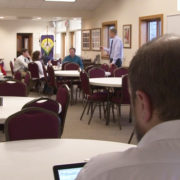Ripples: Barnabas
After Jesus’ ascension, believers spread the gospel around the world in widening ripples.
Daniel N. Balge
“What’s in a name?” Shakespeare’s Juliet asked her Romeo. A name doesn’t matter much, she said.
What’s in a nickname? Actually, quite a bit. A nickname can tell you a lot, maybe more than a name. A nickname tends to stick because it often picks out a distinctive feature or dwells on a prominent aspect of personality.
Consider a nickname Jesus’ apostles gave a man named Joseph, a Jewish Levite from Cyprus. The apostles nicknamed him “son of encouragement” (Acts 4:36). We might have said, “Mr. Encouragement” or with a nod to his given name: “Joe Encouragement.” We know Joseph’s nickname better in Aramaic, “Barnabas.” It stuck. We remember Barnabas better than Joseph as Paul’s companion on his first missionary journey.
We first meet Barnabas as encouragement in action. He sold a field and gave the proceeds for the work of the church (Acts 4:37). Later the leaders of the church in Jerusalem thought so much of Barnabas that they sent him alone to Syrian Antioch (Acts 11:19-24), one of the Roman empire’s great cities. So many had come to faith there, but they lacked a called leader. Luke, the inspired author of Acts, sums up the impact Barnabas made: “When he arrived and saw what the grace of God had done, he was glad and encouraged them all to remain true to the Lord with all their hearts. He was a good man, full of the Holy Spirit and faith, and a great number of people were brought to the Lord” (Acts 11:23,24). Barnabas reacted well to his call to go to Antioch.
In that we see the Holy Spirit’s work in him. What the apostles had spotted in “son of encouragement” was amplified by the Spirit’s power. Yes, Barnabas brought good gifts, but what made him effective was the faith God gave him. Barnabas was “a good man,” a comment less on his God-given competence for the ministry entrusted to him. God’s Spirit had equipped him for this work, called him to it, and blessed it.
Soon Barnabas saw work enough for two in Antioch and went to Tarsus to fetch the former persecutor Saul—soon to be Paul. Barnabas had previously been Saul’s sponsor in a meeting in Jerusalem with Peter and James (Acts 9:26,27; Galatians 1:18,19). After that Saul had spent perhaps eight years in his native city, Tarsus, not, as far as we know, in formal called service, but awaiting God’s direction.
Now in effect Barnabas activated the ministry God had foretold for Saul (Acts 9:15) by bringing him the Holy Spirit’s call to Antioch. Together, apparently with son of encouragement as leader, Barnabas and Saul spent a year in Antioch, preaching and teaching Christ to “great numbers of people” (Acts 11:26). Soon Antioch believers were gathering an offering for famine relief in Jerusalem. Eventually the city became the jump-off point for Paul’s three missionary journeys. Barnabas joined Paul on that first journey.
Antioch was also the first place where believers were called Christians (Acts 11:26), in essence a nickname that tells you a lot about them—and about their pastors. And this nickname, God be praised, has stuck.
Contributing editor Daniel Balge, a professor at Martin Luther College, New Ulm, Minnesota, is a member at St. Paul, New Ulm.
This is the second article in a 12-part series on lesser-known New Testament witnesses.
SUBMIT YOUR STORY
Do you have a manuscript, idea, or story from your own life you’d like to share for use in Forward in Christ or on wels.net? Use our online form to share it to our editorial office for consideration.
SUBSCRIBE TO FORWARD IN CHRIST
Get inspirational stories, spiritual help, and synod news from Forward in Christ every month. Print and digital subscriptions are available from Northwestern Publishing House.
Author: Daniel N. Balge
Volume 103, Number 6
Issue: June 2016
Copyrighted by WELS Forward in Christ © 2021
Forward in Christ grants permission for any original article (not a reprint) to be printed for use in a WELS church, school, or organization, provided that it is distributed free and indicate Forward in Christ as the source. Images may not be reproduced except in the context of its article. Contact us




